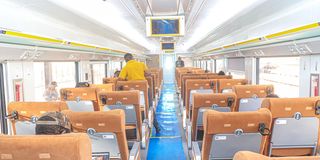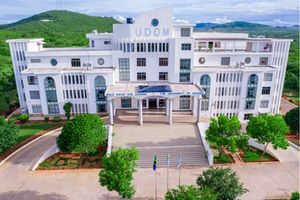Six Tanzanian companies eye SGR operations

A passenger coach on Tanzania's standard gauge railway. PHOTO | FILE
What you need to know:
- Six Tanzanian companies are among several firms that have shown interest in partnering with the government in operating the standard gauge railway
Dar es Salaam. Six Tanzanian companies are among several firms that have shown interest in partnering with the government in operating the standard gauge railway (SGR).
The revelation on Wednesday by Tanzania Railways Corporation (TRC) director general Masanja Kadogosa follows the gazetting of the Railways (Open Access) Regulations, 2024.
Speaking to The Citizen, Mr Kadogosa named the companies as GSM, Bakhresa Group, Mohammed Enterprises Company Limited, Lake Oil, Azania and Jambo. Also on the list are several companies from China and Europe.
“Jambo is the only Tanzanian firm that has shown interest in investing in luxury services for tourists. Others are eager to invest in the transportation of cargo,” he said.
Mr Kadogosa added that TRC was currently working to ensure the construction of all SGR sections are finalised by 2028 so that investors can utilise the potential and play a key role in boosting economic growth.
He reiterated that the SGR was not a replacement for upcountry buses, lorries, planes and the metre gauge railway (MGR), saying they are all meant to complement and expand the transport sector.
Mr Kadogosa said the sustainability of the SGR depends on maintenance and that is why Tanzanians and investors are required to pay for services.
“If we don’t do that, we won’t have the SGR after some years. Since the SGR has been constructed with a lifespan of 100 years, it is important to take care of it.”
Meanwhile, the Railways (Open Access) Regulations, 2024, which allows for a partnership in railway operations between the public and members of the private sector, has been gazetted.
“We announced the Railways (Open Access) Regulations in Government Notice no. 213 on March, 29, 2024. Most of the things that were proposed in the Open Access have not changed much, there might be some slight changes. But if there are some changes they must be very few,” said the acting Head of Legal Services at the Land Transport Regulatory Authority (Latra), Ms Mwadawa Sultan.
She told The Citizen that Latra involved stakeholders from the beginning of formulation of the Railways (Open Access) Regulations, 2024 who came up with several important views that helped to improve the original document.
Under the Railways (Open Access) Regulations, 2024, those interested in becoming independent railway operators will have to fulfil several requirements, including submitting an official application and effecting the charges accordingly.
Upon submitting an application and being granted a licence by a government official – known in the regulations as Infrastructure Manager – the operator will be given access and transit rights for the purpose of operating on any type of railway.
Operators will have to pay the application fee and the licence fee.
The Railway (Open Access) Regulations, 2024 indicate that applicants will pay licence and application fees of $2,000 and $100 on passengers services.
Freight (cargo) applicants will pay licence and application fee of $100 and $4000.
Speaking in October last year during a meeting to discuss the Railways (Open Access) Regulations, the Deputy Permanent Secretary in the Ministry of Transport, Dr Ally Posi, said the money to be paid by the private operators will be primarily used for railway maintenance.




